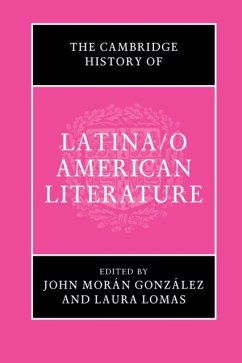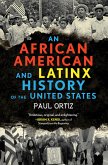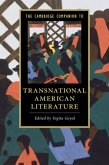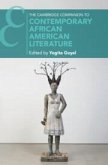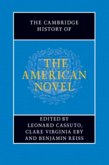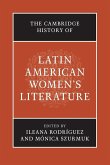The Cambridge History of Latina/o American Literature
Herausgeber: Morán González, John; Lomas, Laura
The Cambridge History of Latina/o American Literature
Herausgeber: Morán González, John; Lomas, Laura
- Broschiertes Buch
- Merkliste
- Auf die Merkliste
- Bewerten Bewerten
- Teilen
- Produkt teilen
- Produkterinnerung
- Produkterinnerung
This comprehensive history of US Latina/o literature from the colonial period through the present elucidates the complex roots of Latina/o writing within the Americas.
Andere Kunden interessierten sich auch für
![The Cambridge History of Jewish American Literature The Cambridge History of Jewish American Literature]() The Cambridge History of Jewish American Literature209,99 €
The Cambridge History of Jewish American Literature209,99 €![An African American and Latinx History of the United States An African American and Latinx History of the United States]() Paul OrtizAn African American and Latinx History of the United States23,99 €
Paul OrtizAn African American and Latinx History of the United States23,99 €![The Cambridge Companion to Transnational American Literature The Cambridge Companion to Transnational American Literature]() The Cambridge Companion to Transnational American Literature31,99 €
The Cambridge Companion to Transnational American Literature31,99 €![The Cambridge Companion to Contemporary African American Literature The Cambridge Companion to Contemporary African American Literature]() The Cambridge Companion to Contemporary African American Literature30,99 €
The Cambridge Companion to Contemporary African American Literature30,99 €![The Cambridge History of the American Novel The Cambridge History of the American Novel]() The Cambridge History of the American Novel56,99 €
The Cambridge History of the American Novel56,99 €![The Cambridge History of Latin American Women's Literature The Cambridge History of Latin American Women's Literature]() The Cambridge History of Latin American Women's Literature51,99 €
The Cambridge History of Latin American Women's Literature51,99 €![The Cambridge History of American Literature The Cambridge History of American Literature]() Sacvan Bercovitch (ed.)The Cambridge History of American Literature204,99 €
Sacvan Bercovitch (ed.)The Cambridge History of American Literature204,99 €-
-
-
This comprehensive history of US Latina/o literature from the colonial period through the present elucidates the complex roots of Latina/o writing within the Americas.
Hinweis: Dieser Artikel kann nur an eine deutsche Lieferadresse ausgeliefert werden.
Hinweis: Dieser Artikel kann nur an eine deutsche Lieferadresse ausgeliefert werden.
Produktdetails
- Produktdetails
- Verlag: Cambridge University Press
- Seitenzahl: 855
- Erscheinungstermin: 21. April 2022
- Englisch
- Abmessung: 222mm x 152mm x 47mm
- Gewicht: 1226g
- ISBN-13: 9781316634172
- ISBN-10: 1316634175
- Artikelnr.: 63199461
- Herstellerkennzeichnung
- Libri GmbH
- Europaallee 1
- 36244 Bad Hersfeld
- gpsr@libri.de
- Verlag: Cambridge University Press
- Seitenzahl: 855
- Erscheinungstermin: 21. April 2022
- Englisch
- Abmessung: 222mm x 152mm x 47mm
- Gewicht: 1226g
- ISBN-13: 9781316634172
- ISBN-10: 1316634175
- Artikelnr.: 63199461
- Herstellerkennzeichnung
- Libri GmbH
- Europaallee 1
- 36244 Bad Hersfeld
- gpsr@libri.de
List of contributors; Acknowledgements: Introduction; Part I. Rereading the
Colonial Archive: Transculturation and Conflict, 1492-1810: 1. Indigenous
Herencias: Creoles, mestizaje, and nations before nationalism; 2.
Performing to a captive audience: dramatic encounters in the borderlands of
empire; 3. The tricks of the weak: Sor Juana Inés de la Cruz and the
feminist temporality of Latina literature; 4. Rethinking the colonial
Latinx literary imaginary: a comparative and decolonial research agenda; 5.
The historical and imagined cultural geographies of Latinidad; Part II. The
Roots and Routes of Latina/o Literature: The Literary Emergence of a
Trans-American Imaginary, 1783-1912: 6. Whither Latinidad?: the
trajectories of Latin American, Caribbean, and Latina/o literature; 7.
Father Félix Varela and the emergence of an organized Latina/o minority in
early nineteenth-century New York City; 8. Transamerican New Orleans:
Latino literature of the Gulf of Mexico, from the Spanish colonial period
to post-Katrina; 9. Trajectories of exchange: toward histories of Latino
literature; 10. Narratives of displacement in places that once were
Mexican; 11. Latina feminism, Latina racism and unspeakable violence:
travel narratives, novels of reform, and histories of genocide and
lynching; 12. José Martí, comparative reading, and the emergence of Latino
modernity in gilded-age New York; 13. Afro-Latinidad: phoenix rising from a
hemisphere's racist flames; Part III. Negotiating Literary Modernity:
Between Colonial Subjectivity and National Citizenship, 1910-1979: 14.
Oratory, memoir, and theater: performances of race and class in the early
twentieth-century Latina/o public sphere; 15. Literary revolutions in the
borderlands: transnational dimensions of the Mexican Revolution and its
diaspora in the United States; 16. Making it nuevo: Latina/o modernist
poetics remake high Euro-American modernism; 17. The archive and
Afro-Latina/o field-formation: Arturo Alfonso Schomburg at the intersection
of Puerto Rican and African American literatures; 18. Floricanto en Aztlán:
Chicano cultural nationalism and its epic discontents; 19. 'The geography
of their complexion': Nuyorican poetry and its legacies; 20. Cuban American
counterpoint: the heterogeneity of Cuban American literature, culture, and
politics; 21. Latina/o theater and performance in the contexts of social
movements; Part IV. Literary Migrations across the Americas, 1980-2017: 22.
Undocumented immigration in Latina/o literature; 23. Latina feminist theory
and writing; 24. Invisible no more: US central American literature before
and beyond the age of neoliberalism; 25. Latina/o life narratives: crafting
self-referential forms in the colonial milieu of the Americas; 26. Poetics
of the 'majority minority'; 27. The Quisqueya diaspora: the emergence of
Latina/o literature from Hispaniola; 28. Listening to literature: popular
music, voice, and dance in the Latina/o literary imagination, 1980-2010;
29. Brazuca literature: old and new currents, countercurrents, and
undercurrents; 30. Staging Latinidad and interrogating neoliberalism in
contemporary Latina/o performance and border art; 31. Transamerican popular
forms of Latina/o literature: genre fiction, graphic novels, and digital
environments; 32. trauma, translation, and migration in the crossfire of
the Americas: the intersection of Latina/o and South American literatures;
33. The Mesoamerican corridor, central American transits, and Latina/o
becomings; 34. Differential visions: the diasporic stranger, subalternity,
and the transing of experience in US Puerto Rican literature; 35. Temporal
borderlands: toward decolonial queer temporality in Latina/o literature;
Epilogue: Latina/o literature: the borders are burning; Chronology;
Bibliography; Index.
Colonial Archive: Transculturation and Conflict, 1492-1810: 1. Indigenous
Herencias: Creoles, mestizaje, and nations before nationalism; 2.
Performing to a captive audience: dramatic encounters in the borderlands of
empire; 3. The tricks of the weak: Sor Juana Inés de la Cruz and the
feminist temporality of Latina literature; 4. Rethinking the colonial
Latinx literary imaginary: a comparative and decolonial research agenda; 5.
The historical and imagined cultural geographies of Latinidad; Part II. The
Roots and Routes of Latina/o Literature: The Literary Emergence of a
Trans-American Imaginary, 1783-1912: 6. Whither Latinidad?: the
trajectories of Latin American, Caribbean, and Latina/o literature; 7.
Father Félix Varela and the emergence of an organized Latina/o minority in
early nineteenth-century New York City; 8. Transamerican New Orleans:
Latino literature of the Gulf of Mexico, from the Spanish colonial period
to post-Katrina; 9. Trajectories of exchange: toward histories of Latino
literature; 10. Narratives of displacement in places that once were
Mexican; 11. Latina feminism, Latina racism and unspeakable violence:
travel narratives, novels of reform, and histories of genocide and
lynching; 12. José Martí, comparative reading, and the emergence of Latino
modernity in gilded-age New York; 13. Afro-Latinidad: phoenix rising from a
hemisphere's racist flames; Part III. Negotiating Literary Modernity:
Between Colonial Subjectivity and National Citizenship, 1910-1979: 14.
Oratory, memoir, and theater: performances of race and class in the early
twentieth-century Latina/o public sphere; 15. Literary revolutions in the
borderlands: transnational dimensions of the Mexican Revolution and its
diaspora in the United States; 16. Making it nuevo: Latina/o modernist
poetics remake high Euro-American modernism; 17. The archive and
Afro-Latina/o field-formation: Arturo Alfonso Schomburg at the intersection
of Puerto Rican and African American literatures; 18. Floricanto en Aztlán:
Chicano cultural nationalism and its epic discontents; 19. 'The geography
of their complexion': Nuyorican poetry and its legacies; 20. Cuban American
counterpoint: the heterogeneity of Cuban American literature, culture, and
politics; 21. Latina/o theater and performance in the contexts of social
movements; Part IV. Literary Migrations across the Americas, 1980-2017: 22.
Undocumented immigration in Latina/o literature; 23. Latina feminist theory
and writing; 24. Invisible no more: US central American literature before
and beyond the age of neoliberalism; 25. Latina/o life narratives: crafting
self-referential forms in the colonial milieu of the Americas; 26. Poetics
of the 'majority minority'; 27. The Quisqueya diaspora: the emergence of
Latina/o literature from Hispaniola; 28. Listening to literature: popular
music, voice, and dance in the Latina/o literary imagination, 1980-2010;
29. Brazuca literature: old and new currents, countercurrents, and
undercurrents; 30. Staging Latinidad and interrogating neoliberalism in
contemporary Latina/o performance and border art; 31. Transamerican popular
forms of Latina/o literature: genre fiction, graphic novels, and digital
environments; 32. trauma, translation, and migration in the crossfire of
the Americas: the intersection of Latina/o and South American literatures;
33. The Mesoamerican corridor, central American transits, and Latina/o
becomings; 34. Differential visions: the diasporic stranger, subalternity,
and the transing of experience in US Puerto Rican literature; 35. Temporal
borderlands: toward decolonial queer temporality in Latina/o literature;
Epilogue: Latina/o literature: the borders are burning; Chronology;
Bibliography; Index.
List of contributors; Acknowledgements: Introduction; Part I. Rereading the
Colonial Archive: Transculturation and Conflict, 1492-1810: 1. Indigenous
Herencias: Creoles, mestizaje, and nations before nationalism; 2.
Performing to a captive audience: dramatic encounters in the borderlands of
empire; 3. The tricks of the weak: Sor Juana Inés de la Cruz and the
feminist temporality of Latina literature; 4. Rethinking the colonial
Latinx literary imaginary: a comparative and decolonial research agenda; 5.
The historical and imagined cultural geographies of Latinidad; Part II. The
Roots and Routes of Latina/o Literature: The Literary Emergence of a
Trans-American Imaginary, 1783-1912: 6. Whither Latinidad?: the
trajectories of Latin American, Caribbean, and Latina/o literature; 7.
Father Félix Varela and the emergence of an organized Latina/o minority in
early nineteenth-century New York City; 8. Transamerican New Orleans:
Latino literature of the Gulf of Mexico, from the Spanish colonial period
to post-Katrina; 9. Trajectories of exchange: toward histories of Latino
literature; 10. Narratives of displacement in places that once were
Mexican; 11. Latina feminism, Latina racism and unspeakable violence:
travel narratives, novels of reform, and histories of genocide and
lynching; 12. José Martí, comparative reading, and the emergence of Latino
modernity in gilded-age New York; 13. Afro-Latinidad: phoenix rising from a
hemisphere's racist flames; Part III. Negotiating Literary Modernity:
Between Colonial Subjectivity and National Citizenship, 1910-1979: 14.
Oratory, memoir, and theater: performances of race and class in the early
twentieth-century Latina/o public sphere; 15. Literary revolutions in the
borderlands: transnational dimensions of the Mexican Revolution and its
diaspora in the United States; 16. Making it nuevo: Latina/o modernist
poetics remake high Euro-American modernism; 17. The archive and
Afro-Latina/o field-formation: Arturo Alfonso Schomburg at the intersection
of Puerto Rican and African American literatures; 18. Floricanto en Aztlán:
Chicano cultural nationalism and its epic discontents; 19. 'The geography
of their complexion': Nuyorican poetry and its legacies; 20. Cuban American
counterpoint: the heterogeneity of Cuban American literature, culture, and
politics; 21. Latina/o theater and performance in the contexts of social
movements; Part IV. Literary Migrations across the Americas, 1980-2017: 22.
Undocumented immigration in Latina/o literature; 23. Latina feminist theory
and writing; 24. Invisible no more: US central American literature before
and beyond the age of neoliberalism; 25. Latina/o life narratives: crafting
self-referential forms in the colonial milieu of the Americas; 26. Poetics
of the 'majority minority'; 27. The Quisqueya diaspora: the emergence of
Latina/o literature from Hispaniola; 28. Listening to literature: popular
music, voice, and dance in the Latina/o literary imagination, 1980-2010;
29. Brazuca literature: old and new currents, countercurrents, and
undercurrents; 30. Staging Latinidad and interrogating neoliberalism in
contemporary Latina/o performance and border art; 31. Transamerican popular
forms of Latina/o literature: genre fiction, graphic novels, and digital
environments; 32. trauma, translation, and migration in the crossfire of
the Americas: the intersection of Latina/o and South American literatures;
33. The Mesoamerican corridor, central American transits, and Latina/o
becomings; 34. Differential visions: the diasporic stranger, subalternity,
and the transing of experience in US Puerto Rican literature; 35. Temporal
borderlands: toward decolonial queer temporality in Latina/o literature;
Epilogue: Latina/o literature: the borders are burning; Chronology;
Bibliography; Index.
Colonial Archive: Transculturation and Conflict, 1492-1810: 1. Indigenous
Herencias: Creoles, mestizaje, and nations before nationalism; 2.
Performing to a captive audience: dramatic encounters in the borderlands of
empire; 3. The tricks of the weak: Sor Juana Inés de la Cruz and the
feminist temporality of Latina literature; 4. Rethinking the colonial
Latinx literary imaginary: a comparative and decolonial research agenda; 5.
The historical and imagined cultural geographies of Latinidad; Part II. The
Roots and Routes of Latina/o Literature: The Literary Emergence of a
Trans-American Imaginary, 1783-1912: 6. Whither Latinidad?: the
trajectories of Latin American, Caribbean, and Latina/o literature; 7.
Father Félix Varela and the emergence of an organized Latina/o minority in
early nineteenth-century New York City; 8. Transamerican New Orleans:
Latino literature of the Gulf of Mexico, from the Spanish colonial period
to post-Katrina; 9. Trajectories of exchange: toward histories of Latino
literature; 10. Narratives of displacement in places that once were
Mexican; 11. Latina feminism, Latina racism and unspeakable violence:
travel narratives, novels of reform, and histories of genocide and
lynching; 12. José Martí, comparative reading, and the emergence of Latino
modernity in gilded-age New York; 13. Afro-Latinidad: phoenix rising from a
hemisphere's racist flames; Part III. Negotiating Literary Modernity:
Between Colonial Subjectivity and National Citizenship, 1910-1979: 14.
Oratory, memoir, and theater: performances of race and class in the early
twentieth-century Latina/o public sphere; 15. Literary revolutions in the
borderlands: transnational dimensions of the Mexican Revolution and its
diaspora in the United States; 16. Making it nuevo: Latina/o modernist
poetics remake high Euro-American modernism; 17. The archive and
Afro-Latina/o field-formation: Arturo Alfonso Schomburg at the intersection
of Puerto Rican and African American literatures; 18. Floricanto en Aztlán:
Chicano cultural nationalism and its epic discontents; 19. 'The geography
of their complexion': Nuyorican poetry and its legacies; 20. Cuban American
counterpoint: the heterogeneity of Cuban American literature, culture, and
politics; 21. Latina/o theater and performance in the contexts of social
movements; Part IV. Literary Migrations across the Americas, 1980-2017: 22.
Undocumented immigration in Latina/o literature; 23. Latina feminist theory
and writing; 24. Invisible no more: US central American literature before
and beyond the age of neoliberalism; 25. Latina/o life narratives: crafting
self-referential forms in the colonial milieu of the Americas; 26. Poetics
of the 'majority minority'; 27. The Quisqueya diaspora: the emergence of
Latina/o literature from Hispaniola; 28. Listening to literature: popular
music, voice, and dance in the Latina/o literary imagination, 1980-2010;
29. Brazuca literature: old and new currents, countercurrents, and
undercurrents; 30. Staging Latinidad and interrogating neoliberalism in
contemporary Latina/o performance and border art; 31. Transamerican popular
forms of Latina/o literature: genre fiction, graphic novels, and digital
environments; 32. trauma, translation, and migration in the crossfire of
the Americas: the intersection of Latina/o and South American literatures;
33. The Mesoamerican corridor, central American transits, and Latina/o
becomings; 34. Differential visions: the diasporic stranger, subalternity,
and the transing of experience in US Puerto Rican literature; 35. Temporal
borderlands: toward decolonial queer temporality in Latina/o literature;
Epilogue: Latina/o literature: the borders are burning; Chronology;
Bibliography; Index.

